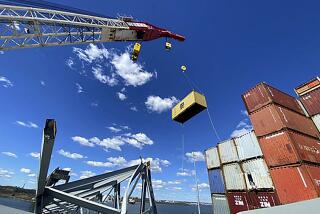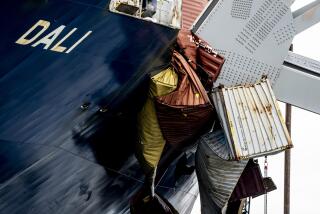Tanker Given 3 Warnings, Hearing Told
- Share via
More National Guardsmen joined the effort Tuesday to remove globs of congealed oil from the Delaware River before rising temperatures liquefy the oil, and hearings opened into two other oil spills in Texas and Rhode Island.
A harbor pilot testified he radioed three warnings to the tanker World Prodigy before it hit a reef and spilled 420,000 gallons of oil off the Rhode Island coast. A Coast Guard officer said the tanker’s captain apparently used the wrong chart to plot his course.
In Texas, the pilot of a tanker that collided with a barge in the Houston Ship Channel testified Tuesday that his vessel didn’t react as expected just before the accident that ruptured the barge and spilled 250,000 gallons of oil. He said sediment buildup in a channel may have kept him from making a turn.
On the Delaware, more than 500 people, including 300 Delaware National Guardsmen, and 22 boats were involved in the cleanup Tuesday. In Philadelphia, Coast Guard spokesman David Oney said Delaware was sending 150 more Guardsmen.
Delaware officials, including Gov. Michael N. Castle, filed suit in federal court Tuesday claiming the cleanup was far too slow and seeking unspecified damages.
About 800,000 gallons of heavy oil spilled into the river Saturday when the Uruguayan tanker Presidente Rivera ran aground. Unlike the lighter oil spilled in Rhode Island and Texas, and the crude oil leaked March 24 in Alaska, the oil coagulated in the cool water into chunks ranging in size from a basketball to two or three feet.
Cleanup workers had been using pitchforks and even their hands to snare the globs from the water because skimmers were jammed by the larger chunks. About 64,000 gallons had been recovered as of Tuesday.
But on Tuesday, the temperature headed out of the 80s and into the 90s, the melting range for the No. 6 industrial heating oil.
“When we’ve got it in chunks, we can pick it up,” said Coast Guard Capt. Larry Murdoch.
Liquefied oil will pose a much greater hazard to shoreline and to wildlife, Murdoch said.
More to Read
Sign up for Essential California
The most important California stories and recommendations in your inbox every morning.
You may occasionally receive promotional content from the Los Angeles Times.













